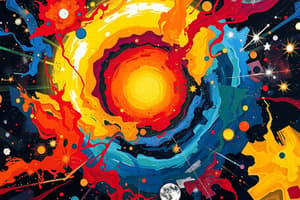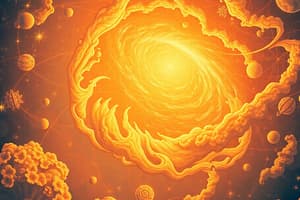Podcast
Questions and Answers
Which of the following gases were present in the early atmosphere of Earth?
Which of the following gases were present in the early atmosphere of Earth?
- Water vapor and Carbon Dioxide (correct)
- Carbon monoxide and Sulfur Dioxide
- Oxygen and Nitrogen
- Helium and Argon
What concept suggests that life may have originated from microbial spores in space?
What concept suggests that life may have originated from microbial spores in space?
- Spontaneous Generation
- Abiogenesis
- Panspermia (correct)
- Chemical Evolution
What did Louis Pasteur's experiments demonstrate regarding the origin of life?
What did Louis Pasteur's experiments demonstrate regarding the origin of life?
- Life comes only from pre-existing life. (correct)
- Life can arise from non-living material under specific conditions.
- Microorganisms can spontaneously generate from inanimate matter.
- Life originated from proteins found in the atmosphere.
What did S.L. Miller's experiment in 1953 create when simulating early Earth conditions?
What did S.L. Miller's experiment in 1953 create when simulating early Earth conditions?
What were the predominant conditions on early Earth that facilitated chemical evolution?
What were the predominant conditions on early Earth that facilitated chemical evolution?
What is the earliest proposed form of life that could have originated around 3 billion years ago?
What is the earliest proposed form of life that could have originated around 3 billion years ago?
Which statement reflects the majority accepted view of the origin of the first cellular life forms?
Which statement reflects the majority accepted view of the origin of the first cellular life forms?
What major theory was challenged by Darwin based on his observations during the H.M.S. Beagle voyage?
What major theory was challenged by Darwin based on his observations during the H.M.S. Beagle voyage?
According to the content, what aspect of life forms has been notably observed over different periods of Earth's history?
According to the content, what aspect of life forms has been notably observed over different periods of Earth's history?
What does the conventional religious literature claim about the age of Earth?
What does the conventional religious literature claim about the age of Earth?
Study Notes
Big Bang Theory and Origin of the Universe
- The Big Bang theory describes the universe's origin through a massive explosion.
- Following the explosion, the universe expanded and cooled, allowing hydrogen and helium to form.
- Gases condensed under gravity, forming galaxies, including the Milky Way, where Earth formed approximately 4.5 billion years ago.
Conditions on Early Earth
- Initially, Earth lacked an atmosphere, covered by water vapor, methane, carbon dioxide, and ammonia from molten mass.
- Ultraviolet rays from the sun broke water vapor into hydrogen and oxygen; hydrogen escaped into space.
- Oxygen reacted with ammonia and methane, forming water and carbon dioxide, leading to the creation of the ozone layer.
- As Earth cooled, water vapor condensed, filling depressions and forming oceans.
Emergence of Life
- Life appeared around 500 million years after Earth formed, nearly 4 billion years ago.
- The panspermia hypothesis suggests that life may have originated from spores transferred from outer space.
- Spontaneous generation theory, which posited that life emerged from decaying matter, was debunked by Louis Pasteur.
Chemical Evolution and Early Life Forms
- Oparin and Haldane proposed that life originated from pre-existing non-living organic molecules through chemical evolution.
- Early Earth conditions included high temperatures, volcanic activity, and a reducing atmosphere rich in methane and ammonia.
- In 1953, S.L. Miller replicated early Earth conditions, producing amino acids, supporting the theory of chemical evolution.
Development of Cellular Life
- Non-cellular life forms are believed to have emerged around 3 billion years ago, consisting of giant molecules like RNA and proteins.
- The first cellular life forms likely appeared approximately 2 billion years ago, existing only in aquatic environments.
Evolution of Life Forms
- Charles Darwin's observations aboard the H.M.S. Beagle led to conclusions about the relationship between current and past life forms.
- Life forms have evolved gradually over time; extinction is a natural part of this process.
- Natural selection, a key mechanism of evolution, explains how traits that enhance survival are passed on, allowing certain organisms to outbreed others.
Evidence for Evolution
- Fossils serve as critical evidence for evolution, revealing the arrangement of life forms across geological time.
- Fossils in different sediment layers indicate variations in life forms and timelines of existence.
- Analogous structures, resulting from convergent evolution, highlight structural similarities in organisms functioning alike through adaptation.
Natural Selection and Adaptation
- The concept of natural selection is reinforced by observations such as the changing prevalence of moth colors due to environmental changes.
- Lamarck's early theory of evolution through use and disuse is no longer accepted; Darwin's natural selection theory is widely accepted.
- Evolution is viewed as an ongoing process shaped by natural selection, driven by variations that enhance survival.
Summary of Evolution Mechanics
- Natural resources are limited, leading to competition and struggle for existence among populations.
- Variations within populations, often heritable, allow some individuals to thrive better under certain environmental conditions.
- Over generations, advantageous traits accumulate, resulting in the emergence of new forms and species.
Studying That Suits You
Use AI to generate personalized quizzes and flashcards to suit your learning preferences.
Related Documents
Description
Explore the fascinating concepts of the Big Bang theory and the origins of the universe. This quiz covers the formation of galaxies, elements like hydrogen and helium, and the early conditions of Earth. Test your understanding of cosmology and the timeline of our universe's development.





